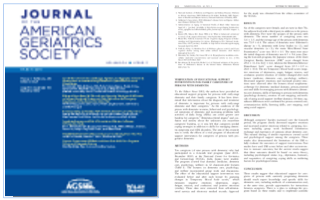清家助教の論文が『Journal of the American Geriatrics Society』に掲載されました
清家理助教、櫻井孝国立長寿医療研究センターもの忘れセンター長、鳥羽研二国立長寿医療研究センター理事長らによる共同研究をまとめた論文が、『Journal of the American Geriatrics Society』Vol.64 Issue 3 (2016 Mar) に掲載されました。
本研究は、 著者らが取り組んでいる認知症をもつ人および家族介護者に対する教育的支援プログラムの分析データからその効果を検証し、今後のプログラムについて展望した論文です。
 Aya Seike, Takashi Sakurai, Chieko Sumigaki, Akinori Takeda, Hidetoshi Endo and Kenji Toba (2016). Verification of Educational Support Intervention for Family Caregivers of Persons with Dementia. Journal of the American Geriatrics Society 64 (3): 661-663
Aya Seike, Takashi Sakurai, Chieko Sumigaki, Akinori Takeda, Hidetoshi Endo and Kenji Toba (2016). Verification of Educational Support Intervention for Family Caregivers of Persons with Dementia. Journal of the American Geriatrics Society 64 (3): 661-663http://onlinelibrary.wiley.com/doi/10.1111/jgs.14017/full ※認証有り
Since 2012, the authors have provided an educational support program for persons with early-stage dementia and their family caregivers. It has been determined that information about the diagnosis and treatment of dementia is important for persons with early-stage dementia and their caregivers.[1] As the condition of the person with dementia worsens, behavioral and psychological symptoms of dementia and increasing problems with activities of daily living (ADLs) can create greater care burdens for caregivers.[2] Dementia-related stigma[3]and confusion and anxiety about the unknown can exacerbate caregivers’ burdens, so it was felt that caregivers needed coping strategies in addition to skills for managing dementia symptoms and ADL disorders. The aim of this research was to verify the effects of a trial program of educational support intervention for caregivers of persons with progressive dementia.
2016/03/23